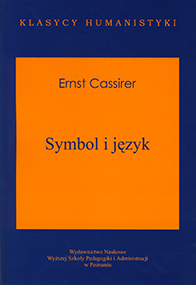Ernst Cassirer, Symbol i język, tłum. Bolesław Andrzejewski
The philosophical work of Ernst Cassirer continues to astonish with its depth and inspirational power. It draws on Enlightenment apriorism from Kant, although it has direct roots in Neo-Kantianism, particularly the Marburg school, known for its extremely immanent interpretation of Kant's "thing-in-itself." However, unlike that Neo-Kantianism, Cassirer’s approach aims to extend apriorism from the realm of mathematical and natural sciences to all other areas of human activity. This creative extension is linked to a new understanding of the concept of "symbol," which Cassirer interprets as an immanent product of the human spirit. This understanding breaks away from the previous association of the "symbol" with the activity of symballein, or the act of "bringing together" two corresponding elements into a whole. The denial of the possibility of "matching" arises from the Neo-Kantian postulate of ignoring any objectively existing "thing-in-itself." Cassirer's epistemological realism, which shifts focus from "substantial" conditions to the "functionality" of subjective symbols, has proven to be extremely fruitful for the development of one of the most vibrant paradigms of twentieth-century cultural understanding—a paradigm that allows us to view culture as autonomous, symbolic, in the new sense of the word, creative activity of the human spirit.
In Poland, the "philosophy of symbolic forms" is still awaiting thorough analysis and popularization. The number of translations of Cassirer’s works is relatively modest. The translation of the late Essay on Man, published in 1977 and subsequently reissued, only partially addresses the Polish "hunger for symbolism." A selection of texts published a few years ago, "Symbol and Language," represented another attempt to fill the significant gap resulting from the lack of Polish translations (even fragmentary ones) of "Philosophie der symbolischen Formen" (Philosophy of Symbolic Forms). It includes texts from the 1920s and early 1930s (i.e., during the peak period of Cassirer’s originality), which thus participated in the birth of the symbolic (Neo-Kantian) concept of culture.
The collection has received a positive reception, and its popularity indicates a high demand for Polish translations of Cassirer’s works. Interest in the book inspired efforts to reissue the edition. The selection revolves around—particularly close to Cassirer—the philosophical and linguistic issues, but its main goal is to bring closer the phenomenon of broadly understood culture.

